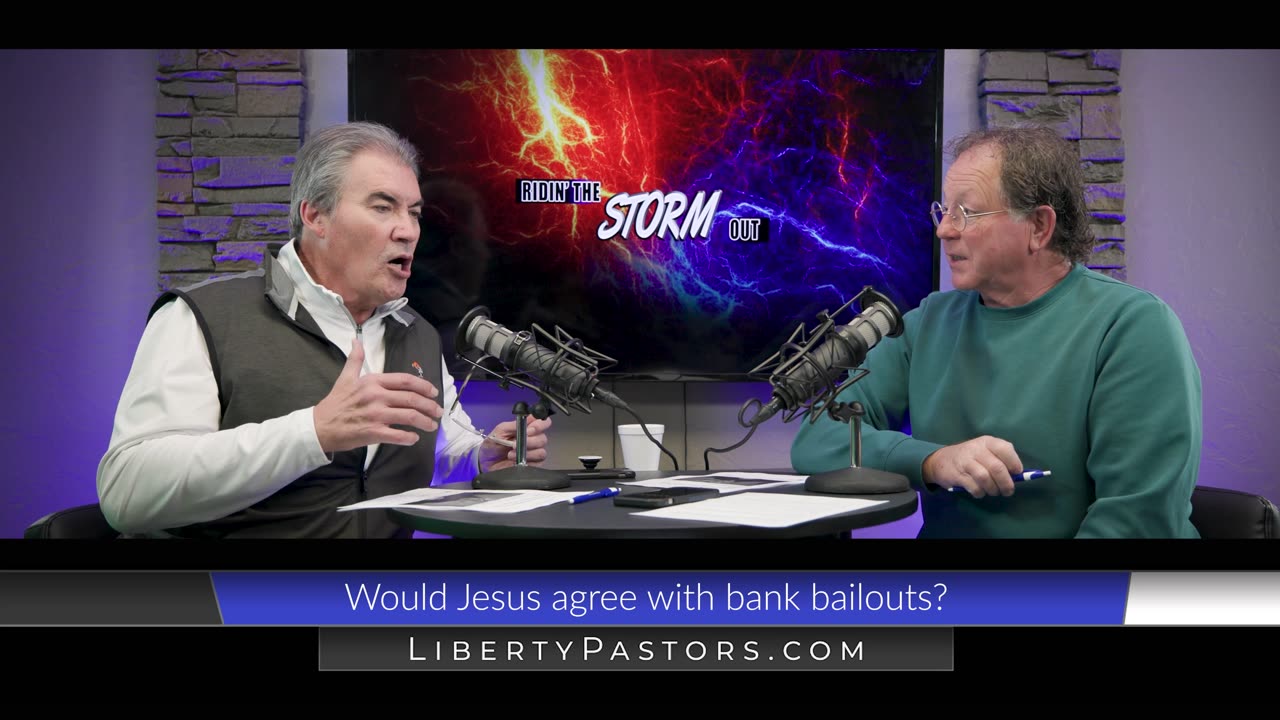Premium Only Content

Would Jesus agree with bank bailouts? | Ridin' the Storm Out | 3/16/23 | (S.5 Ep.11)
Jesus's parables clearly dealt economic concerns such as farming, shepherding, private property ownership, profit, investing capital, borrowing money, debt, stewardship, hiring employees, the principle of a worker being worthy of his wage, workers earning their wages, etc.
The Old Testament outlined God’s principles of private property ownership:
• Each family could own land, but it remains in the possession of the original family
• Even when the land was sold off to pay debts, it was returned to the original family every 50 yrs during the year of Jubilee
• God recognized the right of each landowner to benefit from the farming of their land but instructed them to allow the poor to glean from the corners of their fields (Lev 23:22)
• God established rules for Israelites to lend their own money to others
• The Book of Ruth is a perfect example of private property ownership with the story of Ruth and Boaz
In Mk 10, Jesus told the Rich young ruler to “sell what he owned” as a test of his devotion.
In Mt 20, in the parable of the workers in the vineyard, Jesus talked about employers, employees, and the right of employers to hire who they please at a wage they thought fair.
In Mt 25, in the parable of the talents, Jesus spoke of property owners, private property, investments capital, stewardship responsibility, profit, financial bonuses, laziness and its personal consequences.
People often erroneously teach that Acts 5 encourages socialism when members of the early church were selling their belongings to help support fellow believers. It must be noted that no one was required to sell anything or to give away all of their belongings. The sin of Ananias and Saphira was not that they did not give away all of the proceeds of their property sale, but that they were lying about what they gave to make themselves to appear more generous than they were. In fact, each person could do whatever they chose with their property. In Acts 5:4, Peter said, “While it remained, was it not your own? And after it was sold, was it not in your own control?”
In 2 Cor 9:7, Paul taught that each believer should give as they “decide in their own heart, not reluctantly o r under compulsion, for God loves a cheerful giver.”
In 2 Thess 3:10, Paul taught that no one should expect everyone else to provide a living for them when he said, “if anyone is not willing to work, then he is not to eat.”
Paul went as far as to teach in 1 Tim 5:8 that if a man does not earn his own living and take care of his own family, “he has denied the faith and is worse than an unbeliever.”
In 1 Tim 5, Paul taught that even widows could not expect the church to provide a living for them if they were young enough to remarry, if they had family who could take care of them, or if they were not faithful in ministry through the church.
-
 13:07
13:07
Robbi On The Record
1 hour agoSweet Poison: The Big Fat Lie That’s Killing America
111 -
 LIVE
LIVE
Sarah Westall
1 hour agoFlorida Surgeon General: Operation Warp Speed plus Attacks on RFK Jr w/ Dr Ladapo
1,569 watching -
 LIVE
LIVE
Barry Cunningham
4 hours agoPRESIDENT TRUMP IS THE TROLLER-IN-CHIEF AND MORE BREAKING NEWS!
2,494 watching -
 11:52
11:52
Tundra Tactical
6 hours agoWhy the SIG P320 Is the King of Gun Memes 💥😂
238 -
 1:39:35
1:39:35
Kevin Trudeau
7 hours agoKevin Trudeau: The Complete Creation Algorithm to Manifest Your Goals & Desires
332 -
 1:11:14
1:11:14
Ohio State Football and Recruiting at Buckeye Huddle
3 hours agoOhio State Football: Instant Reaction from the 14-7 win over Texas
11 -
 18:01
18:01
Tactical Advisor
1 hour agoNew Miniature AR15 / New Guns | Vault Room Live Stream 037
9602 -

GamerGril
3 hours agoGG BINGO | 💕 The Beast Inside 💕 | Not Even Scared
5.85K3 -
 2:02:10
2:02:10
Akademiks
3 hours agoWar in RAT-LANTA. Young Thug vs Gunna vs Ralo vs YSL MONDO. Who Will Le Bebe Pick. FINAL CRASHOUT!
28.7K7 -
 1:13:36
1:13:36
Jeff Ahern
3 hours ago $2.24 earnedThe Sunday Show with Jeff Ahern
12.2K6